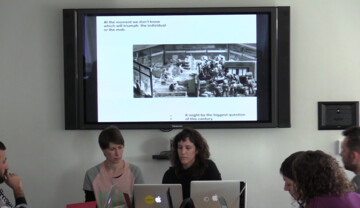Cultural institutions are composed by the oftentimes contradictory requirements to be a place of knowledge production (programmes), to ensure public relations (visibility and audience numbers), to adhere to financial means (revenue and support), to have a local and relational agenda (political stance). Within this embodiment, professionalised cycles dictate a way of life and nurture a professional language and the systematic → construction of daily production. While the creation and implementation of a particular language/voice helps to define the attitude and position of an institutional model, they are also in place to open a clear path for communication; just as working structures are there for efficiency in terms of time, finances and project realisation. However, the longer these practices are active, the stricter the rules become. Rules and regulations create homogenised processes. In order to allow for all potential transformative steps, institutions must set back professional drives and open themselves to unanticipated encounters and knowledge resources. A remapping is required, one that considers a more open playing field where anyone with specialised knowledge rather than professional status can act as a conduit for imagining a different future. The task is to denaturalise institutions’ presumed authority, or at the least to understand that it is only a presumption to be reasoned and disputed.
In our experience at SALT, constituents and constituencies are individuals. Through thinking about the term “constituencies” and whether it is the appropriate one for the scenario we are talking about, we laid down an evolutionary pattern of how the institution can be built from within and without; whereby the understanding of a public then forms an audience, who become users, who can be understood within or as a constituency, but with the aim to enable an organic economy of exchange/reciprocation that leads towards a future network of practicing + reciprocating individuals that just are and are unnamed by the institution:
public ➤ audience ➤ user ➤ constituency ➤ practicing individual ➤ individual
This charter attempts to illustrate our thinking of how practicing individuals might take the lead in an organically enabling environment of de-professionalisation.
- Moments of exchange take place with individuals.
- Constituents can only be thought of as reciprocating individuals.
- One individual with one good question is capable of transforming one grand institution. Listen.
- Acknowledge constituencies are not respected simply because they can be framed as a group of people with similar sensibilities; individuals are empowered independently – groups emerge through shared meaning but can shift and regroup at any time.
- Individuals and groups invited in by the institutions are collaborators. Never target existing groups and frame them as constituencies for institutional benefit.
- Constituencies are not to be searched for. They make themselves visible when it’s time for them to take their stand.
- Do not pretend to be open to critique in order to open access for responsiveness. If there are sincere questions, the answers should be forthcoming. Managing focus groups and steering responses only re-enforces hierarchy.
- Constituencies come from inside as well as outside: Not all employees of one institution share similar ideas about that institution. Ask around.
- Test and enlarge boundaries by allowing the insiders to act in your opposition.
- Get ready to shift around in the office; don’t conform to a job title and description just because it exists. Avoid its constraints, embrace its ambivalence.
- Accept that it is time to denaturalise the institution’s presumed authority or at least understand that it is only a presumption to be reasoned and disputed.
- The institution does not perform in the present time, hence its constituents cannot only be considered in the present, and they should instead be imagined across time all locked into a singularity. Do not time-stamp constituencies.
- Apply ethical measures for true acceptance of outsiders’ input. Do not resort to paying one and not the other.
- Remember: culture is neither owned through nor produced by degrees.
- Remember: the point is not to interpret the world, but to be in it and accept the consequences of a co-ownership in order to turn ownership over when the time comes.
- Beware: Don’t call people names. Defining terminology has the immediate power of turning potential practice into corporate agenda.


